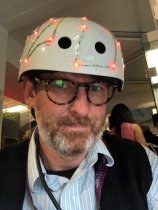Résumé
The emerging field of bioelectronics provides a novel alternative to pharmaceutical intervention by using electronic hardware to intelligently sense and stimulate the nervous system.
I will summarize the challenges and opportunities of translational bioelectronic systems face when bridging basic science, regulated technology, and health care economics – particularly for applications in paediatric medicine. This assessment motivates an innovation framework that leverages the unique capabilities of bioelectronic platforms -- from designing implantable scientific instruments that enable novel clinical neuroscience, to applying the resulting science to prototype new therapies. To provide an illustrative example of the platform and innovation framework, I will highlight experiences from the “Picostim-DyNeuMo,” which is a collaborative, investigational research tool developed jointly by industry and academics. This system is targeting first-in-human clinical studies exploring challenging neurological disorders such as epilepsy, chronic pain, and disorders of consciousness, and the talk will emphasize the innovations required specifically for addressing paediatric epilepsy.

